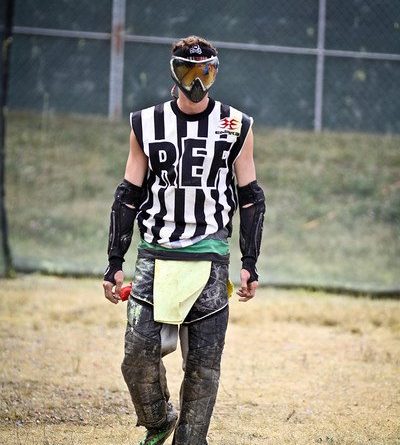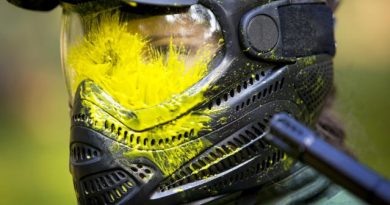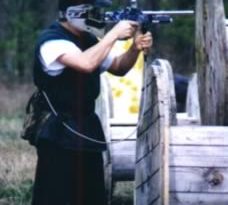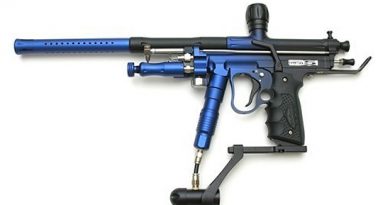Paintball Officiating
There’s no unifying handbook, no universial qualification, no certificates of achievement. We run the games, we keep the peace, we call the shots on and off the field. From the thick woods of the northeast, to the airball arenas on the West Coast, from smoke-filled scenario battleground to backyard game, we are the gatekeepers.
Welcome to the difficult, under-appreciated job of paintball officiating. Many players ref part time at the local fields for discounts or a bit of extra pocket cash and the majority of large event referees are players themselves. It is this dual role that gives most of us an edge. Making the transition from player to referee isn’t instantaneous. Be prepared to have a lot of fun and see some great games, to learn about playing styles and apply them to your own game, and to encounter a plethora of personalities (of both good natured and bad tempered dispositions). The quality of the referee often determines the rating a field receives by its players, especially in feedback seen by others such as PBReview’s (http://www.pbreview.com/) online field rating system and in local communities. Unlike administrative and sale’s personell, the ref is intimately connected with the player’s every day experience.
Additionally, refs are expected to perform a myriad of other tasks such as field maitenance, cleaning, garbage disposal, basic levels of marker maitenance and repair, as well as certain tasks like filling CO2 and HPA tanks, acting as customer service representatives, processing paperwork, and promoting the field in general. Did I mention you’re probably getting minimum wage?
Why Care?
It’s difficult to do a good job on the field without some motivation. Its definitely about the money, or about the tough people you’ll inevitably have to deal with. Since most of paintball’s referees are players, we can relate to how we want our day (and hard earned cash) to go. We want smooth running games and paintchecks on other players, and maybe a nice conversation between games. One cannot expect to receive what he does not give.
But what if you’re new to the ref scene? Use your best judgement, but here are a few guidelines. As your practical know-how and experience grows, so will your confidence and accuracy. Never hesitate to ask the head ref for advice, he’s there to help.
Game Mechanics
1. Check him ref! – Seemingly the most obvious aspect of the game is to make sure players leave when they’re hit. Different fields have different rules about hits. Make sure you understand the rules of the field you’re officiating at. Do gun hits count? Does cumulative splatter constitute a hit? Can players shoot through the cracks of bunkers, or be shot through them? Whether on a speedball course or in the woods, players will be asking for you to paintcheck them and others. An old player’s trick is to ask for a paintcheck on someone who is relatively hidden, so that you will give him away. Not every request for a paintcheck needs to be entertained, especially for players who call for checks on people they aren’t remotely close to hitting. Sometimes a paint check should be given simply to satiate the player, as opposed to an actual investigation on an otherwise clean opponent, but individual discretion reigns supreme. Whatever you do, don’t be stingy on the checks – you’ve been hired as a referee and being hit is in the job description. Bring a shield and wear padding and a neck protector if you want, but never hesitate to get right in the action.
The actual paintcheck itself needs to be quick and thorough. Players have signed a waiver to play on your field. Don’t be afraid to touch a player to check him, which might include moving his clothing or touching his pack. If you’re a male checking a female player and need to see an area that shouldn’t be grabbed at, quickly inform the player that you need to perform a paint check. I’ve seen many hits on packs and near shoes that were not caught because the referee didn’t take the time to shift the clothing to examine the area – that one hit can make the difference in a game, and while it’s usually not a problem in recball, it could easily create a situation.
Image Caption: One hand on the head, one arm pointed toward the player signifies an elimination. Remove the player’s armband and call “Player out!”
2. Snake! Snake Hot! – A common mistake that occurs frequently in the snake, but also in other bunkers, is that new referees will tend to stare at a player that no one else knows is there. Like with an eye exam you should be moving your eyes, not your head. Make no indication by gesture of the presence of other players who are sneaking up the other side of the field (casual repositioning to call the play is much better) or running to bunker someone. Be prepared to quickly and clearly call someone out without affecting the play itself.
3. Positions – Different postures are also helpful on the field. Off the break, many major event referees lay prone to see hits on the chest or pack so that they cannot be wiped by a dive or slide. Players not used to referees so close to them may feel the lane is restricted by your presence. Still, prone is a great position to use if you have other referees to cover the initial calls that require running – keep your shield over your neck, if you have one, and have a good angle to see one side of a team off the break. Never prone in front of a bunker.
Crouching is also helpful to maintain mobility but get a good angle. I like to crouch near the dorito side of an X-Ball field so I can cover the potential hits off the break on my side of the field and be ready to run and pull someone. I also get a great angle on the dorito players on my side and any crossfield mirrors on the other side of the field that would be shooting it out with the tape. In recball, two referees may cover a single large game so its important to be able to quickly observe from multiple angles.




